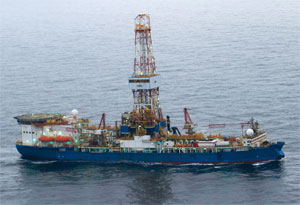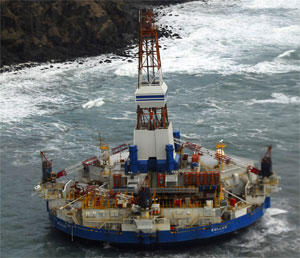Royal Dutch Shell is petitioning the U.S. government for a five-year extension to explore for oil and gas off Alaska’s Arctic coast, citing legal and regulatory roadblocks that have stymied the company’s “best efforts and demonstrated diligence” over the past eight years.
Specifically, Shell is requesting a suspension of its leases on the Outer Continental Shelf (OCS) of the Beaufort Sea and Chukchi Sea. If approved, it would effectively extend Shell’s deadlines to drill there. Many of the 10-year leases are scheduled to expire as soon as 2017.
In a July letter to the U.S. Bureau of Safety and Environmental Enforcement, Shell Alaska Vice President Peter Slaiby said that even if the legal and regulatory obstacles were immediately resolved, “prudent exploration is now severely challenged” due to the expiration dates.
“To date, Shell has committed more than $6 billion to secure and pursue its OCS leases,” Slaiby wrote. “Yet, despite Shell’s best efforts and demonstrated diligence, circumstances beyond Shell’s control have prevented, and are continuing to prevent, Shell from completing even the first exploration well in either area.”
Circumstances cited by Slaiby include restrictions on seasonal transit dates to access lease sites; weather and sea ice conditions; multiple federal court and administrative actions; accommodation of the native whaling season in the Beaufort Sea, and the limited number of “Arctic-viable and regulatory-compliant” drilling rigs.
Slaiby proceeded to detail the loss of six drilling seasons, beginning with 2007, the year that Shell initially anticipated boring its first exploratory wells in the Beaufort Sea. Descriptions of “numerous and unexpected delays” are also provided for the years 2008, 2009, 2010, 2011 and 2014.
 |
|
Drillship Noble Discoverer was cited for safety violations. |
|
Courtesy U.S. Coast Guard |
The 10-page letter was published in October by the environmental group Oceana, which obtained it through a Freedom of Information Act request.
Portions of seven paragraphs — primarily in a section comparing Alaska OCS conditions to the Gulf of Mexico — have been redacted.
The document does not mention the 2012 Arctic drilling season, when two vessels deployed by Shell experienced well-publicized problems.
The drillship Noble Discoverer, contracted by the company from Noble Drilling Corp., nearly went aground in July 2012 in Dutch Harbor after dragging anchor in 30-knot winds. Four months later, the vessel had to be towed to the Port of Seward after losing propulsion. U.S. Coast Guard inspectors there cited the vessel for 16 safety and pollution control violations.
The conical drilling unit Kulluk, being towed to Seattle, ran aground in December 2012 along Sitkalidak Island after breaking loose from tugboats in near-hurricane conditions. Coast Guard investigators later determined that Shell’s desire to avoid millions of dollars in state taxes — set to kick in Jan. 1, 2013 — influenced the decision to move Kulluk out of Alaska in the final days of 2012. The investigators also cited “inadequate assessment and management of risks” for the tow in rough winter weather.
Shell skipped the 2013 drilling season due to a self-imposed moratorium. The company proposed to resume operations in the Chukchi Sea in 2014 with an upgraded Discoverer and a second drillship, Polar Pioneer, to be kept on standby, but postponed the project due to a federal court ruling that challenged the validity of the offshore Arctic leases. Shell did not respond to repeated inquiries from Professional Mariner about the possibility of drilling in the region in 2015.
The company’s request for a five-year OCS lease suspension is under review by the Department of the Interior.

